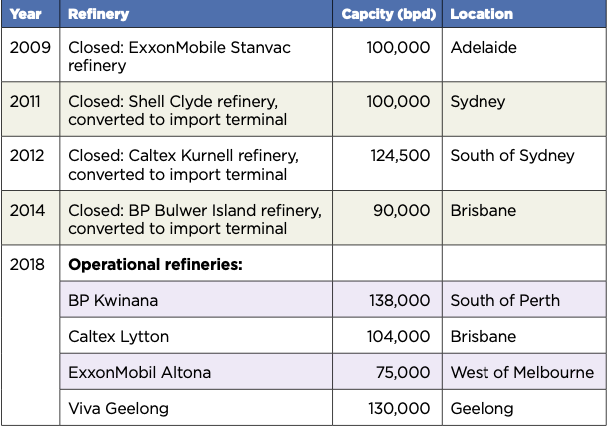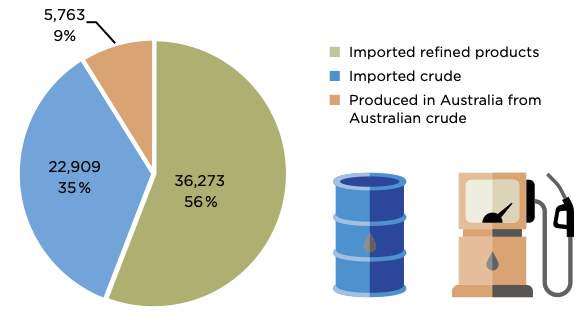Fuel supply measures to secure Australia’s long-term energy security

Pic: Matthias Kulka / The Image Bank via Getty Images
Australia’s fuel security has raced up the government’s agenda with Prime Minister Scott Morrison pledging to build new domestic fuel storage facilities and to keep refineries open.
New onshore diesel fuel storage facilities with a combined capacity of 780 megalitres are being created at a cost of $211m along with other measures to keep fuel prices low.
There will be a minimum stockholding obligation for key transport fuels, and government is backing Australia’s fuel refining sector by supporting a fuel production payment.
“Fuel security underpins our entire economy,” the prime minister said, adding that the fuel supply business supports thousands of jobs, and keeps industry moving.
The fuel security measures build on the government’s earlier decision to purchase $94m of crude oil at record low prices for storage in the US Strategic Petroleum Reserve for access in an emergency.
Coronavirus crisis has revealed energy security weak points
“Like all sectors of the economy, the COVID-19 pandemic is having an impact on Australia’s fuel industry. The events of 2020 have reminded us that we cannot be complacent,” Morrison said.
The prime minister said the spending on energy security would be unveiled in the government’s October 6 budget.
Morrison said Australia had been fortunate to not have experienced a significant fuel supply shock for more than 40 years.
More than 100 oil and gas companies are listed on the ASX and many stand to benefit from the focus on energy security.
ASX oil stocks with a market cap of under $100m include Central Petroleum (ASX:CTP), Horizon Oil (ASX:HZN) and Lakes Oil (ASX:LKO).
Government to ease financial pressure on domestic refineries
Energy minister Angus Taylor said the government recognised that Australian oil refineries were under significant financial pressure, and it wanted to ensure the industry’s future.
Australia’s transport sector derives 98 per cent of its energy from liquid fuels, while farmers and miners depend on diesel to operate their businesses, Taylor said.
According to reports, Australia has 20 days’ worth of diesel fuel in reserve, while for jet fuel and petrol supply levels are currently around 27 days and 25 days, respectively.
A minimum stockholding obligation will act as a safety net for petrol and jet fuel stocks, and raise diesel fuel stocks by 40 per cent.
The government’s modelling shows that Australia’s domestic fuel refining capability is worth $4.9bn over 10 years to consumers in terms of putting downward pressure on fuel prices.
A modern online fuel reporting system will make it easier for industry to report stock levels to government and improve the timeliness of data.
Several Australian oil refineries have closed in recent years

Australia’s fuel stocks at critical levels: MUA
The fuel security plan was welcomed by the Maritime Union of Australia, with one or two reservations.
The seafarers’ union said the minimum stockholding measure would still fall short of the International Energy Agency’s stockholding target of 90 days for oil-refined fuels.
The union’s own research showed Australia had three weeks or less of stockpiled fuel.
More than 90 per cent of Australia’s liquid fuel was delivered by foreign-registered ships and tankers, and 12 Australian-crewed oil and fuel tankers were no longer in service.
“The Morrison government’s initial steps to enhance domestic fuel refining and storage capacity are a good start, but genuine energy security requires action on how fuel is transported to Australia and around the coast,” MUA national secretary Paddy Crumlin said.
Korea, Japan and Singapore account for 69 per cent of Australia’s fuel imports, the MUA said.
The COVID-19 pandemic had highlighted how quickly an event of this kind or similar, such as a military conflict, natural disaster or economic shock, could impact the supply of essential goods, Crumlin said.
“The COVID-19 crisis reinforced how absolutely essential shipping is, not only to fuel security, but also to maintaining other domestic supply chains that provide essential deliveries.”
The MUA called for a fleet of Australian-owned and crewed vessels for fuel supplies.
Australia’s oil needs are met mostly from imports

Related Topics

UNLOCK INSIGHTS
Discover the untold stories of emerging ASX stocks.
Daily news and expert analysis, it's free to subscribe.
By proceeding, you confirm you understand that we handle personal information in accordance with our Privacy Policy.








